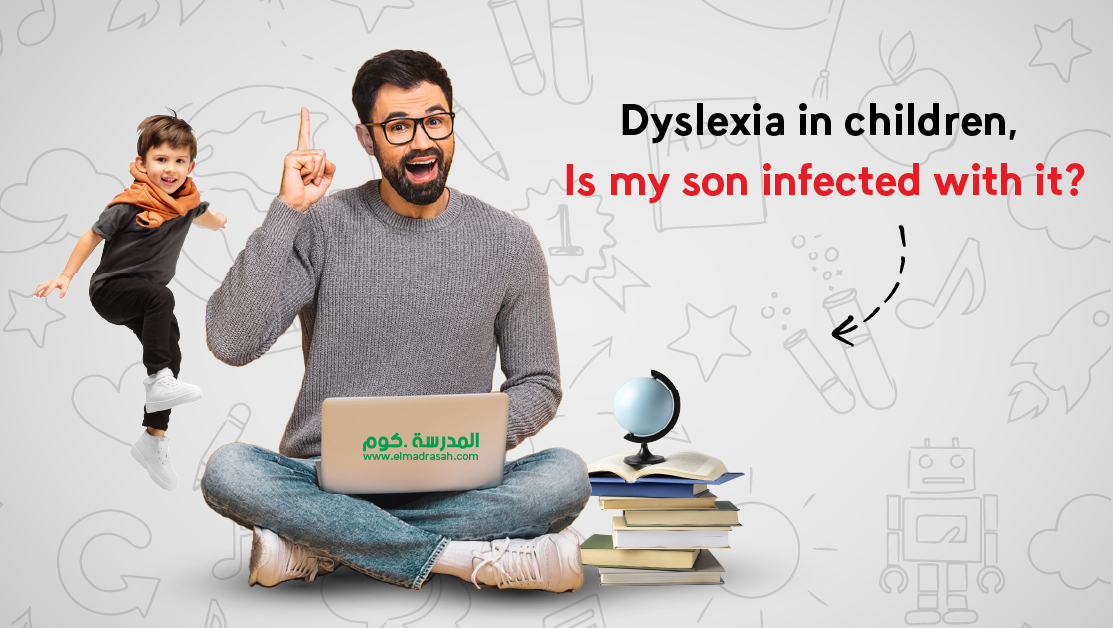
Dyslexia in children is a common problem facing many parents, as it is one of the problems that affect the child’s school and social life, as it is difficult to learn to read and understand texts, as those with this problem face problems in identifying speech sounds and learning how they relate to each other, and parents may ask themselves, about this problem and they wonder if their son has it, in this article we will cover all aspects of dyslexia and how to deal with it to help parents diagnose this problem.
Dyslexia in children
Dyslexia is one of the most common problems among children in the school stage, as this disorder that occurs in the brain causes difficulties in reading and decoding letters and words, as children with this problem suffer from various disorders that affect their mental development and motor skills, which makes them unable to engage in daily activities smoothly.
For this reason, parents should be keen to identify the reading difficulties and Symptoms in their children and support them with the necessary assistance to deal with this problem and overcome it successfully.
Causes of Dyslexia in children
There is more than one reason for the occurrence of reading difficulties Symptoms common among children, the most important of which are:
- Heredity is one of the most important reasons for this problem, as children with a family history of dyslexia suffer more than others.
- The presence of neurological disorders and defects in mental and physical development can affect the development of reading and writing.
- The negative emotional and social experiences that children face while learning to read are difficulties in this area.
Therefore, one should be aware that dyslexia does not necessarily mean low intelligence, but rather a problem that requires treatment and support from parents and teachers, and a good diagnosis of reading difficulties from the beginning.
What are the symptoms of reading difficulties in children?
Dyslexia in children is characterized by the inability to understand and recognize written words correctly, and among the most prominent reading difficulties Symptoms experienced by children with dyslexia are:
- They are late in reading and writing compared to their peers.
- Repetitive rewinding or repetition of words, and the need to understand meaning in terms of vocabulary rather than carrying it as a whole text.
- Difficulty remembering numbers and letters.
- Missing the prescribed words and putting them on paper.
As for parents, they should be careful to notice any symptoms of reading difficulties and communicate with the school and the attending physician to diagnose the problem and appropriate treatment, through a test to diagnose dyslexia to ensure that the maximum benefit is achieved for the child.
Diagnosis of Dyslexia in children
Dyslexia in children cannot be diagnosed in children with just one test. It requires a comprehensive evaluation of the symptoms and functions associated with this disorder. Information is collected from various sources including medical history, medical examination, and online psychological and neurological evaluation.
Dyslexia in children can be identified through many available tools, including:
-
Use standard reading tests
Standard tests, the most important of which is the Dyslexia Diagnostic Test, are essential elements in diagnosing Dyslexia in children.
These tests include:
- Assess the child’s ability to read, spell, transliterate, and analyze grammatical sentences.
- These tests are conducted in a special environment that helps the child to focus and express himself properly.
- These tests help determine the level of a child’s reading and writing skills and identify factors that affect his language development.
- These tests are a good starting point for the child’s educational needs, which are key to achieving success in school.
One of the most important of these tests is the Arabic dyslexia test for children.
It is considered one of the important tools to determine if a child has a problem with dyslexia, and there are types such as:
- The Ron Davis test is one of the tests used to diagnose dyslexia in children.
- The DSTG tests a wide range of questions and tasks related to reading, writing, spelling, and reasoning, to assess the scope and extent of a child’s reading disorder.
- An accurate scientific diagnosis of reading difficulties is made by a specialized psychiatrist, and the results depend on the child’s psychological and educational growth and development.
The test helps in:
- Assess the level of the child’s ability to read and deal with words properly.
- The Arabic dyslexia test includes several reading and writing skills, such as recognizing and forming letters, sounds, and words, formulating sentences, and accurately understanding the meanings of written texts.
- The test aims to help therapists find the best way to help Dyslexia in children, improve their reading and writing abilities and improve their success rates and academic achievement.
It is important to detect signs of dyslexia early in order to provide appropriate treatment and support for children with this disorder.
-
Counseling with teachers and parents
Dyslexia Diagnostic Tests include Arabic dyslexia test and consultation with teachers and parents, where teachers and parents can notice any signs of the child and his behavior during study and reading activities. This diagnostic tool is useful in:
- Provide comments and notes to specialists, therapists, and experts in dyslexia about children.
- Information collected from parents and teachers provides valuable and useful information about an individual child’s performance in reading and writing.
- To find the underlying cause of dyslexia, teachers and parents can note any challenges a child may face while learning and work on finding solutions to overcome these challenges.
Everyone strives to support the child and help him develop reading and writing skills in the best way possible.
-
Conduct psychological and neurological examinations to determine the main cause of the problem
The process of diagnosing dyslexia requires a high level of analytical and inferential ability and requires the use of unique diagnostic tools.
Among the most prominent of these tools are psychological and neurological examinations, as they help in:
- Accurately identify the problem by analyzing the various mental and physical aspects of the child.
- These tests include brain, eye, ear, speech, memory, attention, and much more.
- These tools enable the identification of any defects or distortions in the child’s speech, auditory or visual perception, and this helps in developing an integrated treatment plan commensurate with the child’s condition and achieving tangible and sustainable improvement for him.
Therefore, parents and teachers should conduct a Dyslexia Diagnostic Test and pay attention to children learning how to read from a young age and encourage them to read books appropriate for their age, as this will help develop their reading skills.
How can dyslexic children be helped?
Children with reading difficulties Symptoms can be helped in a number of ways, including:
- Provide the school or teacher specialized in this case.
- Paying attention to different teaching methods that suit the child’s way of thinking and help him excel, such as using educational games and illustrative examples.
- The child can be encouraged to read and write regularly and be enabled to practice various motor activities that strengthen the connection between learning and movement.
- Ultimately, dealing with Dyslexia in children requires collaboration between the school, parents, doctors, and therapists to ensure the best care and education is provided to help the child change a situation that can negatively affect his studies and social life.
And all this support in terms of activities and training at the hands of specialists, you can find with the Elmadrasah.com platform, which offers packages to treat reading difficulties online, at the hands of specialists in learning difficulties of all kinds.















